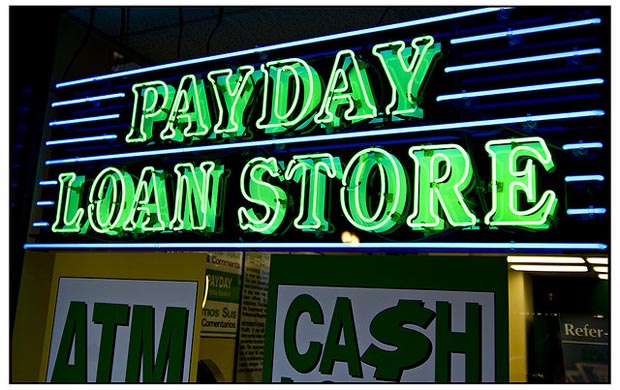State Has Weak Payday Loan Regulations
Average borrower in state pays 528%. Now Trump has weakened federal regulations.

Payday loans. Photo by Aliman Senai / (CC BY-SA).
The Trump administration has weakened a proposed rule aimed at protecting people from predatory loan providers.
The original rule, which has been in the works since 2016, would have required payday and auto title loan providers to verify a potential borrower’s ability to repay the loan before it is granted. The rule also would have limited the number of times a borrower can renew a payday loan, which can carry interest rates approaching 600 percent.
But the federal Consumer Financial Protection Bureau delayed implementing that rule last year and finalized a revised rule Tuesday that rolls back key protections for borrowers.
Advocates say tougher regulations are needed because payday and auto title loan providers prey on poor consumers who cannot get traditional loans at lower interest rates.
Former Republican Gov. Scott Walker and GOP-controlled legislature approved looser restrictions on payday lenders in the 2011 state budget.
A 2016 WISPIRG report found Wisconsin residents who used payday lenders typically earn less than $19,000 and take out an average of 12 loans per year. But borrowers paid a whopping average annual percentage rate of 589 percent, partly because Wisconsin is one of only a handful of states that does not cap the industry’s lending rates.
In 2019, the state said the average annual payday loan interest rate was about 528 percent.
Between January 2010 and December 2019, payday and auto title loan and check-cashing companies made $550,580 in individual, political action committee, and corporate contributions to Wisconsin legislative candidates, legislative campaign committees, and partisan statewide candidates. Payday lenders gave $469,455, or 85 percent, of those contributions to Republican candidates and fundraising committees.
Topping the list of recipients of payday lender industry contributions were:
Republican Assembly Campaign Committee, $106,800
Committee to Elect a Republican Senate, $70,350
Former GOP Gov. Scott Walker, $59,055
State Senate Democratic Committee, $24,900
Republican Senate Majority Leader Scott Fitzgerald, of Juneau, $23,050
Legislative campaign committees that received top contributions from the industry are used by legislative leaders to milk a wide range of special interests for campaign contributions to spend on elections.




















